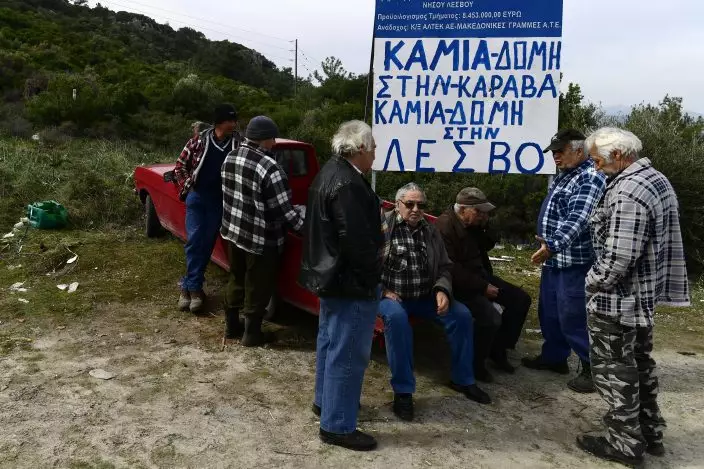Protest groups on three eastern Greek islands on Monday begun setting up blockades aimed at stopping the government from building new migrant detention centers.
The groups on Lesbos, Chios, and Samos have received broad support on the islands, including from municipal authorities and farming associations.
The government says it is determined to build detention centers on recently appropriated land to replace overcrowded camps on the islands — announcing that construction would resume this week after a brief break for consultations.

Local residents gather at a roadblock near Mandamados village on the northeastern Aegean island of Lesbos, Greece, Monday, Feb. 24, 2020. Protest groups on three eastern Greek islands have begun setting up blockades aimed at stopping the government from building new migrant detention centers. the sign reads "No camp at Karava, no camp on Lesbos." (AP PhotoMichael Varaklas)
But many islanders fear that new facilities will only increase the number of migrants and refugees after the government failed to deliver on a pledge to ease overcrowding over the winter months.
“We are guarding the (appropriated) area, and if they start building, everyone here and from the surrounding villages will join the protest — because we don't want this,” Stephanos Apostolou, a protest organizer and municipal council member from the village of Mandamados on Lesbos, told The Associated Press.
Greece remains the European Union's busiest entry point for refugees and migrants, with nearly 4,000 making the winter crossing from Turkey to Greek islands this year through Feb. 16, according to data from the United Nations refugee agency.

Croatia's European Affairs Minister Gordan Grlic-Radman, left, speaks with the Greek Foreign Minister Nikos Dendias during a meeting of Foreign ministers from southeast European countries focused in European Union membership efforts in the Balkan region, in the northern city of Thessaloniki, Greece, on Monday, Feb. 24, 2020. Croatia's European Affairs Minister Gordan Grlic-Radman told the Associated Press on the sidelines of the meeting that a priority of his country's presidency of the European Union was to improve screening mechanisms to separate legitimate asylum seekers from other migrants entering the 27-nation bloc. (AP PhotoGiannis Papanikos)
Croatia's Foreign and European Affairs Minister Gordan Grlic-Radman, whose country holds the rotating presidency of the European Union, said its priority was to improve screening mechanisms to separate legitimate asylum seekers from other migrants entering the 27-nation bloc.
“We have to make a distinction between the refugees and illegal immigration," he told the AP, speaking on the sidelines of a meeting of southeast European foreign ministers in the northern Greek city of Thessaloniki.
"That's very important and we have to fight the smugglers, the criminals who organize illegal immigration and we should should protect the European Union from illegal immigration.”


